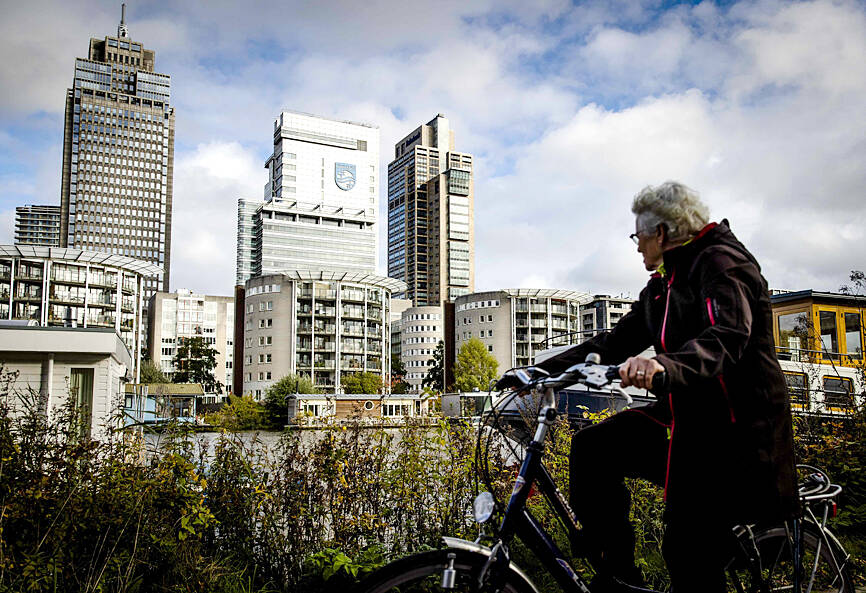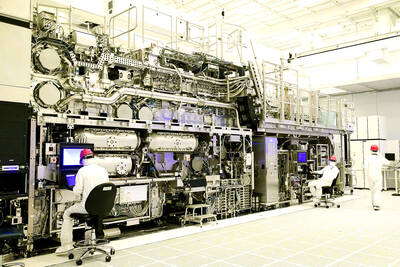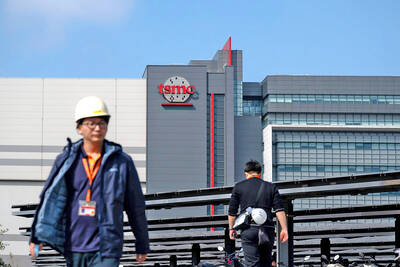Royal Philips NV yesterday said that it had reached a US$1.1 billion deal to settle US lawsuits over faulty sleep machines that have dogged the Dutch medical device maker.
The company’s shares soared more than 45 percent on news of the settlement, which was less onerous than feared by some shareholders.
Philips has been battling a series of crises since 2021 over its DreamStation machines for sleep apnea, a disorder in which breathing intermittently stops during sleep.

Photo: ANP/AFP
Millions of devices were recalled over concerns that users were at risk of inhaling pieces of noise-canceling foam and fears it could potentially cause cancer.
The company earlier this year decided to halt new sales in the US of the machines made by subsidiary Philips Respironics.
The company has reached an agreement with the plaintiffs “to resolve the personal injury litigation and the medical monitoring class action to end the uncertainty associated with litigation in the US,” Philips said in a statement.
The company said it did not “admit any fault or liability, or that any injuries were caused by Respironics’ devices.”
The agreement addresses claims filed in US courts and other potential cases, it added.
“Patient safety and quality is our highest priority, and we have taken important steps in further resolving the consequences of the Respironics recall,” Philips chief executive Roy Jakobs said in the statement.
“The remediation of the sleep therapy devices for patients is almost complete, and the test results to date show the use of these devices is not expected to result in appreciable harm to health,” Jakobs added.
“We do regret the concern that patients may have experienced,” he said, adding that the settlements were “significant milestones and provide further clarity on the way forward for Philips.”
Philips, which has had to cut thousands of jobs, posted a loss of 463 million euros (US$496 million) over the full year last year.
It yesterday reported a loss of 824 million euros in the first quarter of this year on sales totaling 4.1 billion euros.
Philips said the settlement payments are expected to take place next year and would be funded through cash-flow generation.
The company said it booked a provision of 982 million euros in the first quarter to cover the settlement.
Philips said it also concluded an agreement with insurers to pay Philips 540 million euros to cover Respironics recall-related claims.
“The three biggest litigation cases that we had are now put behind us,” Jakobs said in a conference call.
“We can move on and that’s very important,” he said, while cautioning that it “doesn’t mean that everything is resolved.”

ASML Holding NV’s new advanced chip machines have a daunting price tag, said Taiwan Semiconductor Manufacturing Co (TSMC, 台積電), one of the Dutch company’s biggest clients. “The cost is very high,” TSMC senior vice president Kevin Zhang (張曉強) said at a technology symposium in Amsterdam on Tuesday, referring to ASML’s latest system known as high-NA extreme ultraviolet (EUV). “I like the high-NA EUV’s capability, but I don’t like the sticker price,” Zhang said. ASML’s new chip machine can imprint semiconductors with lines that are just 8 nanometers thick — 1.7 times smaller than the previous generation. The machines cost 350 million euros (US$378 million)

Apple Inc has closed in on an agreement with OpenAI to use the start-up’s technology on the iPhone, part of a broader push to bring artificial intelligence (AI) features to its devices, people familiar with the matter said. The two sides have been finalizing terms for a pact to use ChatGPT features in Apple’s iOS 18, the next iPhone operating system, said the people, who asked not to be identified because the situation is private. Apple also has held talks with Alphabet Inc’s Google about licensing its Gemini chatbot. Those discussions have not led to an agreement, but are ongoing. An OpenAI

INSATIABLE: Almost all AI innovators are working with the chipmaker to address the rapidly growing AI-related demand for energy-efficient computing power, the CEO said Taiwan Semiconductor Manufacturing Co (TSMC, 台積電) yesterday reported about 60 percent annual growth in revenue for last month, benefiting from rapidly growing demand for artificial intelligence (AI) and high-performance computing applications. Revenue last month expanded to NT$236.02 billion (US$7.28 billion), compared with NT$147.9 billion in April last year, the second-highest level in company history, TSMC said in a statement. On a monthly basis, revenue surged 20.9 percent, from NT$195.21 billion in March. As AI-related applications continue to show strong growth, TSMC expects revenue to expand about 27.6 percent year-on-year during the current quarter to between US$19.6 billion and US$20.4 billion. That would

‘FULL SUPPORT’: Kumamoto Governor Takashi Kimura said he hopes more companies would settle in the prefecture to create an area similar to Taiwan’s Hsinchu Science Park The newly elected governor of Japan’s Kumamoto Prefecture said he is ready to ensure wide-ranging support to woo Taiwan Semiconductor Manufacturing Co (TSMC, 台積電) to build its third Japanese chip factory there. Concerns of groundwater shortages when TSMC’s two plants begin operations in the prefecture’s Kikuyo have spurred discussions about the possibility of tapping unused dam water, Kumamoto Governor Takashi Kimura said in an interview on Saturday. While Kimura said talks about a third plant have yet to occur, Bloomberg had reported TSMC is already considering its third Japanese fab — also in Kumamoto — which would make more advanced chips. “We are